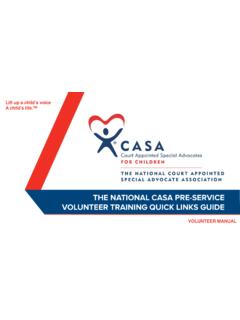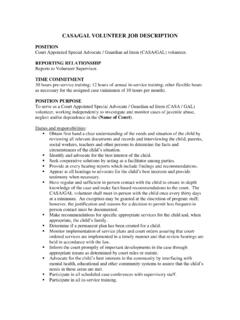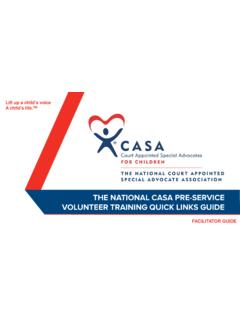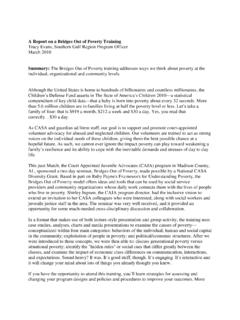Transcription of VOLUNTEER HANDBOOK POLICIES AND PROCEDURES
1 VOLUNTEER HANDBOOK POLICIES AND PROCEDURES A POWERFUL VOICE IN A CHILD S LIFE Mission The San Francisco Court Appointed Special Advocate (SFCASA) Program trains community volunteers to serve as officers of the court to advocate for the best interests of abused and neglected children in the foster care system. Vision Our vision is that every child has a safe, loving home and is given the opportunity to thrive. The San Francisco CASA Program 100 Bush Street, Suite 650 San Francisco, CA 94104 (415) 398-8001 2 Table of Contents Preface .. 4 Program POLICIES .. 4 Role of the CASA VOLUNTEER .. 4 Role of the CASA Supervisor .. 6 Role of Child Welfare Services .. 6 VOLUNTEER Training .. 6 Continuing Education .. 7 Training Manuals .. 7 Case Matching .. 7 CASA Case Files and Notes .. 8 Ending a Case .. 8 Reasons for Dismissal .. 8 Resigning from CASA.
2 9 Grievance Process .. 9 Statements to the Public .. 10 Reporting Abuse to the Authorities .. 10 Court Reports .. 11 Case Notes .. 11 Monthly Update .. 12 Recording VOLUNTEER Hours .. 13 Home Visits .. 13 Federal VOLUNTEER Protection Act of 1997 .. 13 Transportation .. 14 3 Safety Issues .. 15 Confidentiality .. 15 Email Communication .. 17 SFCASA Social Media Reasons for Exclusion .. 20 4 Preface This manual provides guidelines for helping a CASA VOLUNTEER work their case effectively, to follow CASA POLICIES , and to remember CASA s role in the court system. This manual is not intended to replace VOLUNTEER training. On the contrary, this manual supplements the training all volunteers receive and assumes the user has a basic understanding of the CASA program. CASA volunteers are professionals working alongside other professionals, such as attorneys, judges and social workers.
3 CASA has a voice in the court system to ensure that every abused and neglected child has the right to a safe, permanent home. Program POLICIES A Court Appointed Special Advocate (CASA) program provides trained community volunteers to advocate for the best interests of the children who come into the court system primarily as a result of abuse or neglect. A CASA program has a mission and purpose in keeping with the mission and purpose of the National and California CASA Association and abides by the National and California CASA Code of Ethics and Standards. A CASA program operates with access to legal counsel. The management and operation of a CASA program assures adequate supervision of CASA volunteers. A CASA program keeps written records on each VOLUNTEER applicant and case.
4 The program also maintains management and personnel POLICIES and PROCEDURES , screening PROCEDURES , training curriculum, and relevant data on each case and on the operation of the program. A CASA program does not accept applicants if they have been convicted of, or have charges pending for, a felony or misdemeanor involving a sex offense, child abuse or neglect, or related acts that would pose risks to children or the CASA program s credibility. A CASA program strives to be an inclusive organization whose volunteers, staff, and board members reflect the children they serve and the community in terms of gender, ethnicity, and cultural and socio-economic background. Role of the CASA VOLUNTEER A CASA VOLUNTEER is appointed by the court to advocate for children who come into the court system primarily as a result of abuse or neglect.
5 A CASA VOLUNTEER advocates for the best interests of the child to whom they are assigned. They perform an independent investigation and then report back to the judge with their findings through written reports. They supplement the role of other professionals involved in the case. They visit with their child(ren) on a regular basis. They interview and collaborate with the parents, 5 teachers and social workers. A CASA becomes a consistent support for the child throughout their time as a dependent of the court. Qualifications and Abilities of the CASA VOLUNTEER To make a minimum 18 month commitment to the program. To understand and follow all CASA POLICIES . To maintain confidentiality at all times. To respect and relate to people from various backgrounds in a variety of settings. To communicate effectively both orally and in writing.
6 To gather and accurately record factual information. To meet report deadlines and requirements. To be objective, open-minded and flexible. To accept supervision and seek feedback from CASA staff. To maintain professional and collaborative relationships with all community service providers. To provide one s own transportation. To pass a security check including a criminal background check, DMV record check, Child Abuse Index Registry check, and four [4] Letters of Recommendation. Responsibilities of the CASA VOLUNTEER Maintain consistent weekly contact with assigned CASA child(ren). Maintain consistent monthly (or more often when necessary) contact with CASA Supervisor. To attend conferences and/or court hearings regarding CASA child(ren). Provide a monthly record of hours spent on CASA Case to CASA Supervisor (see monthly log samples at end of HANDBOOK ).
7 Maintain appropriate case notes. Provide CASA Supervisor with court reports at least ten days prior to each hearing. Attend 12 hours of on-going training during the course of a year (see page 6). To always have professional conduct, be respectful, tactful and patient while performing your duties as a CASA VOLUNTEER , keeping in mind that you are acting under the direct authority of the Dependency Court as well as the CASA program. The CASA VOLUNTEER does not engage in the following activities: Take the child to your home. Give legal advice or therapeutic counseling to youth or family. Be related to any parties involved in a case or employed in a position or agency that may result in a conflict of interest. ( foster parent) Make placement arrangements for the child. All activities prohibited by local dependency and juvenile courts.
8 Include a spouse, significant other, own children in activities with assigned child. 6 Transport the child in a vehicle with anyone other than a sworn CASA VOLUNTEER or CASA staff. Transport a child/youth without required insurance limits. Disclose the confidential placement of a foster youth to anyone other than CASA staff, Child Welfare Worker or the minor s attorney. Give money or provide financial support to the child, child s family or caregiver. Role of the CASA Supervisor A CASA supervisor is assigned to a VOLUNTEER to give guidance and support. A CASA supervisor and a VOLUNTEER become a team working together to ensure that a child s best interests are being met. CASA supervisors assist volunteers in information gathering, court report writing, and are available to the VOLUNTEER to discuss questions and concerns that may arise.
9 Supervisors also attend court hearings and help edit court reports. A CASA VOLUNTEER is expected to maintain contact with their case supervisor, at a minimum of once a month. CASA volunteers must also submit monthly logs to their case supervisor once a month. Failure to maintain contact with your case supervisor is grounds for dismissal. Role of Child Welfare Services Child Welfare Services primary concern is the safety of the child. Child Welfare Services is mandated by law to protect children from abuse and neglect. The role of the social worker is to investigate abuse allegations, identify service needs, and work with families and/or the courts to develop strategies that will enable the family to successfully and safely parent their child(ren). VOLUNTEER Training Volunteers attend 40 hours of VOLUNTEER training.
10 Training covers areas such as: child abuse and neglect, courtroom PROCEDURES , court report writing, substance abuse, permanency, child development, cultural awareness, and other topics that involve child welfare. Outside professionals such as social workers, attorneys, judges, and others who are actively involved with the child welfare system participate in the VOLUNTEER training. After volunteers have completed their initial training, they are sworn-in by a judge as officers of the court. 7 Continuing Education Volunteers are required to attend twelve hours of continuing education throughout the year. This training may be obtained in a variety of ways: attending SFCASA continuing education classes, attending workshops or classes in the community, watching pertinent videos, reading applicable books, etc.















